A cocktail of drugs may work against a whole family of viruses
There is still no approved general cure for enterovirus infections, but Norwegian trials appear promising.
Enteroviruses are a group of viruses that cause everything from the common cold to meningitis, polio, type 1 diabetes, and much more. Over 100 different types have been described by researchers, and millions of people are infected each year.
“Enteroviruses pose a significant global health problem,” said Erlend Ravlo, a PhD research fellow at NTNU’s Department of Clinical and Molecular Medicine.
It may therefore sound a bit strange that we still haven’t developed an approved general treatment or a vaccine for this group of viruses.
One explanation may be that infected patients usually recover well without medication. Sometimes, however, things can really take a turn for the worse, especially with children, which is why it is important to find a treatment method that can work against multiple enteroviruses.
Enteroviruses
- Enteroviruses are a group of small viruses.
- The name enterovirus comes from the fact that the virus primarily infects cells in the gastrointestinal tract (‘enteric’ meaning intestinal).
- Among the diseases they can contribute to are meningitis, the common cold, hand-foot-and-mouth disease, myocarditis, pancreatitis, hepatitis, polio, sepsis, and type 1 diabetes.
- Infection usually causes mild symptoms but can, in rare cases, lead to severe illness, especially in newborns and young children.
Source: NIPH/Denis Kainov
https://www.fhi.no/sm/smittevernhandboka/sykdommer-a-a/enterovirusinfeksjoner/?term=
Medication cocktail stops replication
Researchers are on the trail of a solution. Viruses replicate by making copies of themselves within the cells they infect, and that is where an intervention can be made.
“We have identified a combination of drugs that appears to prevent enteroviruses from replicating,” said Aleksandr Ianevski at the Department of Clinical and Molecular Medicine.
The combination of drugs has not yet been tested on humans, but trials have been conducted on human cells and cultures of mini-organs in the laboratory – and the results are positive.
The work on enteroviruses has involved dozens of researchers in Norway and other European countries. The research results have now been published in two research articles.
The corresponding authors are professors Denis Kainov and Magnar Bjørås, both from the Department of Clinical and Molecular Medicine.
You might also like: Tiny brains, hearts and lungs can help cure disease https://gemini.no/2024/10/miniorganer-gir-haap/
Can be taken orally
One combination consists of three drugs already known to health professionals: pleconaril, AG7404 and mindeudesivir. This combination of medicine can be taken orally.
These drugs have already been individually tested on humans, and safe doses of the combination appear to be effective against enteroviruses in cells and cultures of mini-organs.
“In addition, the combination does not alter glucose or insulin levels when tested on pancreatic cells in the laboratory,” said Kainov.
This is good news for people who have or fear developing diabetes.
The researchers have also tested the combination on mini-organs that simulate hearts, and it does not appear to alter the heart rate, which is, of course, also important.
“This cocktail of medicines is really promising,” said Bjørås.
Tested several combinations
Finding the optimal combination of drugs took time. The NTNU researchers tried other possible treatments by testing several different mixtures.
“To find an effective treatment, we analyzed the toxicity and effectiveness of 12 known agents that can work against a wide range of enteroviruses. We tested them both individually and in combination, and against different viruses in cell cultures,” explained Kainov.
A promising combination is pleconaril, rupintrivir and remdesivir, which was effective against several viruses in lung cells and intestinal organoids. However, since rupintrivir and remdesivir cannot be taken as a single combined pill, the researchers replaced them with AG740 4 and mindeudesivir. The new combination is still effective, while being more practical because it can be taken as a single pill.
“Our studies show great potential for finding broad-spectrum treatment methods against enteroviruses,” said Kainov.
Bjørås emphasized that more studies are needed before we can confirm that these combinations of drugs are also effective in patients. These studies must involve several different enteroviruses, both in the laboratory and in clinical trials on humans.
References:Ravlo, E., Ianevski, A., Schjølberg, JO. et al. Synergistic combination of orally available safe-in-man pleconaril, AG7404, and mindeudesivir inhibits enterovirus infections in human cell and organoid cultures. Cell. Mol. Life Sci. 82, 57 (2025). https://doi.org/10.1007/s00018-025-05581-4








